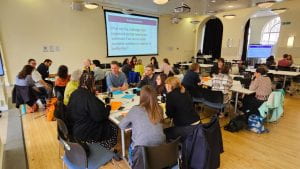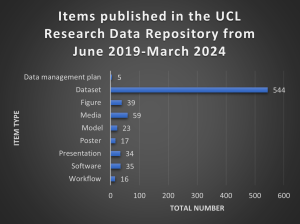(Update: Deadline Extended!) Call for Papers & Posters – UCL Open Science Conference 2024
By Rafael, on 21 March 2024
Theme: Open Science & Scholarship in Practice
Date: Thursday, June 20th, 2024 1-5pm, followed by Poster display and networking
Location: UCL Institute of Advanced Studies, IAS Common Ground room (G11), South Wing, Wilkins Building
We are delighted to announce the forthcoming UCL Open Science Conference 2024, scheduled for June 20, 2024. We are inviting submissions for papers and posters showcasing innovative practices, research, and initiatives at UCL that exemplify the application of Open Science and Scholarship principles. This internally focused event aims to showcase the dynamic landscape of Open Science at UCL and explore its practical applications in scholarship and research, including Open Access Publishing, Open Data and Software, Transparency, Reproducibility, Open Educational Resources, Citizen Science, Co-Production, Public Engagement, and other open practices and methodologies. Early career researchers and PhD students from all disciplines are particularly encouraged to participate.
Conference Format:
Our conference will adopt a hybrid format, offering both in-person and online participation options, with a preference for in-person attendance. The afternoon will feature approximately four thematic sessions, followed by a poster session and networking opportunities. Session recordings will be available for viewing after the conference.
Call for papers
Submission Guidelines:
We invite all colleagues at UCL to submit paper proposals related to Open Science and Scholarship in Practice, some example themes are below. Papers could include original research, case studies, practical implementations, and reflections on Open Science initiatives. Submissions should adhere to the following guidelines:
- Abstracts: Maximum 300 words
- Presentation Length: 15 minutes (including time for questions)
- Deadline for Abstract Submission: F̶r̶i̶d̶a̶y̶, A̶p̶r̶i̶l̶ 2̶6̶ Friday, May 3. (Deadline Extended!)
Please submit your abstract proposals using this form.
Potential Subthemes:
- Case Studies and Best Practices in Open Science and Scholarship
- Open Methodologies, Transparency, and Reproducibility in Research Practices
- Open Science Supporting Career Development and Progression
- Innovative Open Data and Software Initiatives
- Promoting and Advancing Open Access Publishing within UCL
- Citizen Science, Co-Production, and Public Engagement Case Studies
- Open Educational Resources to Support Teaching and Learning Experiences
Call for Posters
Session Format:
The poster session will take place in person during the evening following the afternoon conference. Posters will be displayed for networking and engagement opportunities. Additionally, posters will be published online after the conference, potentially through the Research Data Repository. All attendees are encouraged to participate in the poster session, offering a platform to present their work and engage in interdisciplinary discussions.
Submission Guidelines:
All attendees are invited to propose posters showcasing their work related to Open Science and Scholarship in Practice. Posters may include research findings, project summaries, methodological approaches, and initiatives pertaining to Open Science and Scholarship.
Deadline: Friday, May 24
Please submit your poster proposals using this form.
Next Steps
Notifications of acceptance will be sent in the week ending May 10th for Papers and June 7th for Posters.
Recordings of the UCL Open Science Conference 2023, are available on this blog post from May 2023.
For additional information about the conference or the calls, feel free to reach out to us at openscience@ucl.ac.uk.
Watch this space for more news and information about the upcoming UCL Open Science Conference 2024!
 Close
Close






!["We invite you to share your insights on the UCL Research Repository and help us improve our service! Take just 5-10 mins to complete a brief internal survey. Thank you! [Link: https://buff.ly/3Tg1Fna] Image: A figure with blue & green clothing with a speech bubble reading 'tell us what you think'.](https://blogs.ucl.ac.uk/open-access/files/2024/04/Copy-of-Pink-Minimal-Recruitment-Twitter-Post-1-5d3ce82295fad533-300x169.png)

